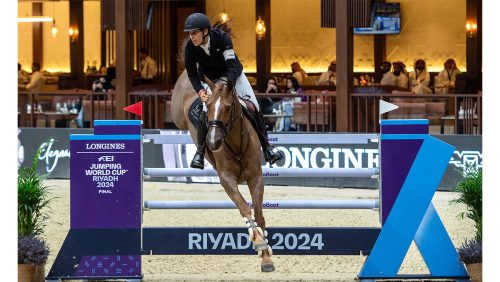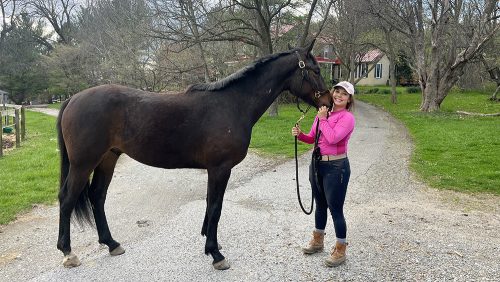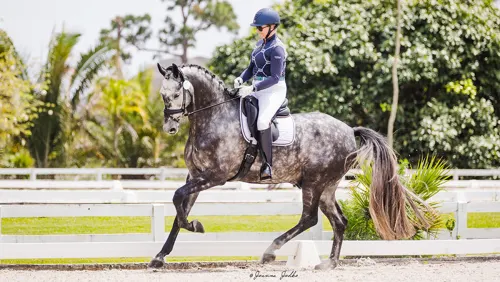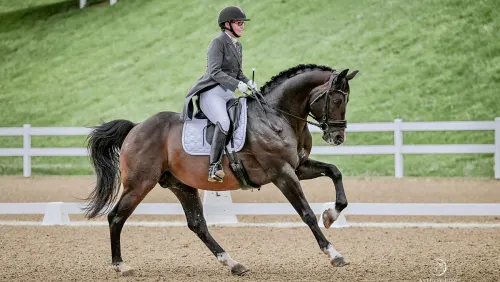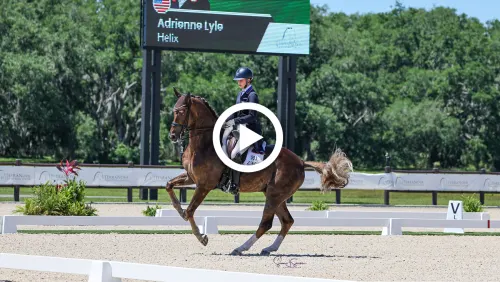August 2 — London
Carl Hester and Laura Bechtolsheimer should’ve been jubilant after the first day of dressage in front of their hometown crowd with Great Britain well into the lead. But despite taking first and second place respectively, their scores of 77.72 percent and 76.27 percent left them worried about the hunt for team gold.
“I’m pretty gutted for my team that the score didn’t reflect what we thought it would be,” said Bechtolsheimer. “It’s by far my lowest percentage I’ve had in recent years. I hope it’s just because the marks are lower here. But at this stage I don’t really know what to say.”
The last time she scored below 77 percent with Mistral Hojris was in 2010.
“I felt like ‘Alf’ put in a really solid performance as usual,” said Bechtolsheimer, 27. “I had one little mistake at the end of the extended canter, but other than that, in parts he got a little bit strong, but I was always able to bring him back. He never got away from me. He remained concentrated and focused the whole way through the test.”
But the Brits weren’t the only ones affected by low scores. The Netherlands’ Anky van Grunsven, who was riding her double Olympic champion Salinero, finished in fifth place with 73.34 percent, and the lone U.S. rider of the day, Jan Ebeling, rode a very solid test with Rafalca for 70.24 percent and 13th place.
However, the first German rider to go, Dorothee Schneider on Diva Royal, placed third on 75.28 percent, and the other two German team riders, Kristina Sprehe on Desperados and Helen Langehanenberg on Damon Hill, will ride tomorrow. That left the Brits seriously questioning what would happen if the judges came down with a case of “second afternoon-itis” where the scores come up dramatically.
While Hester also thought he might’ve received higher marks based on his performance with Uthopia, he was also philosophical about the scores.
“The horse got slightly over the bridle from where I was sitting. I think it was just the tension,” he said of Bechtolsheimer’s performance. “He looked a little bit strong. It’s such a powerful performance from the horse, but the way they’re judging, it’s such a knowledgeable crowd now. You’ve got the Judges Supervisory Panel. When you have a mistake, it’s penalized. Before those top horses with a mistake didn’t come down so low. Here, they really seem to be like, “A mistake is a mistake, and you get a 4.’ “
Uthopia also swapped off at the end of the extended canter, almost exactly the same mistake Mistral Hojris had.
This is the first time the JSP has been part of the Olympic Games. Three international judges will review the marks, and they have the ability to adjust for mistakes in the judging. It’s also the first Olympics to feature half marks and seven judges: Two additional judges sit at F and K.
ADVERTISEMENT
Hester remained optimistic for their team chances, especially as the Grand Prix Special, which takes place on Aug. 7, will count toward the team score as well at this Olympic Games, a change from years previous, and he thought a few more days would do Mistral Hojris some good.
“It’s the best thing that can happen for Charlotte [Dujardin, the third rider for Great Britain],” said Hester. “I’m sure that Charlotte will go ‘Rarrrr.’ She’ll just get in there and do what she has to do. She’s never ridden in an Olympic Games, but you know her attitude is that it’s just an arena.”
Job Well Done
Jan Ebeling was full of praise for Rafalca after their test. “I think I had a really good ride, and I am very happy with it,” he said. “I think my second pirouette started a little bit large; she jumped off the line a little bit. Overall it was great. My piaffes were really nice, and that’s something that has really improved over the last couple of months. The piaffe-passage was good, my frame was good, she was up, and she felt really good. She felt strong, and she’s fit. I think she is peaking at just the right moment.”
He brushed off the storm of media attention he’s received recently because Rafalca belongs in part to Ann Romney, the wife of presidential hopeful Mitt Romney. Jan’s wife, Amy Ebeling, and Beth Meyer also own a part of the 15-year-old Oldenburg mare (Argentinius—Ratine, Rubinstein).
“There certainly was a lot of media attention going on,” said Jan. “I think it really ended up being a good thing for the sport, and I don’t really get distracted by these things. I have a good way of focusing, and if I don’t want to talk to anybody I just don’t answer my phone.”
He said Rafalca felt amped up in the big arena. “You can feel it, she’s a little bit stronger than usual. There’s a little more oomph in her movement and more suspension,” he said. “It’s better because she has more expression, but it’s a little bit harder to control the whole thing. We’re really not allowed to talk, but I talk to her the whole time in there trying to calm her down a little bit. I scratch her on the neck with my finger.”
Ann was able to attend the Games, so she was sitting with Amy and Meyer to watch the test, but Jan said he hadn’t spoken to her yet today.
“Before the test I don’t really talk to anybody. They know that. My three ladies are probably up there in tears right now. I never meant to have this effect on women!” he joked.
A Scary Start
Van Grunsven’s morning didn’t leave her in the best state of mind to compete. “Sjef [Janssen, her husband] was sick this morning. He couldn’t come in. First I had to organize medical support for him. He was throwing up a lot, and because of his history of the last half year we needed a doctor. Luckily, our official team doctor came immediately. Then I could think about the competition,” she said.
ADVERTISEMENT
She got Swedish rider Patrik Kittel to watch her warm-up with Salinero, but she didn’t ask for full power from the 18-year-old Hanoverian (Salieri—Luna, Lungau) in the ring.
“I wanted to do the halts and have no mistakes in the extended trots and make a good start for the team with a clear start of the test,” she said. “I know I’m not the strongest this year, so I should be the safer one as well. After today I have the feeling that in the Grand Prix Special I can put a little bit more on. You have to find out the first day if he’s too hot, too slow or whatever.”
Van Grunsven almost didn’t come to the Olympics this year, as she knew a third individual gold medal wasn’t likely to happen. The first few days of the national Dutch Championships went so poorly she almost went home.
“On Sunday morning, my son [Yannick, who is 7,] said to me, ‘If it’s really not going well, maybe you should have lessons of my teaching.’ I said, ‘Yeah, that’s a great plan.’ ” said van Grunsven with a laugh. “He said, ‘I really want you to go to London.’ He was so into it.”
The freestyle went well after her talk with her son, so then van Grunsven thought briefly about retiring Salinero on a high note. “I woke up on Monday, and I thought it’s not in my character to give up half way. So I did the second qualification at Rotterdam as well. The Grand Prix was OK, not special enough. Then in the kür it was good again, and the crowd was amazing. I thought, ‘Oh, they all think I should go.’ And my son and Sjef all wanted me to go.
“Then I called Peter van den Hoogenband, who is one of our famous swimmers. He won a lot of gold medals. He was in Beijing, and in Sydney he won I don’t know how many medals, but in Beijing he won no medals,” van Grunsven continued. “I called him, and I said, ‘How did you feel about that?’ He said, ‘It was great!’ ”
That call helped van Grunsven put things in perspective. “I don’t ride because of getting famous. I’m riding because I like to ride,” she said. “It’s such a nice finish for Salinero instead of thinking it’s not so good, let’s quit. He’s 18 years old and still going. I know it’s different than four years ago, but that’s normal. He won two Olympics already. I’m proud he’s here. I think I can be a great support to my team, and that’s why I’m here.”
Canadian rider David Marcus had the unthinkable happen when his horse, Capital, reacted terribly to the atmosphere and started bolting off in his test. He couldn’t bring the 12-year-old Danish Warmblood (Crevi’s Lavallo—Indira Gandhi, Weinberg) back under control and was eliminated.
“Things were going fine until he spotted a TV camera in the corner, and the crowd were moving around in their seats due to the rain, and it all went wrong,” said Marcus. “He’s not typically like that, so it caught me off guard. In the barn we call him the Quarter Horse because he’s such a pet and such a level-headed horse. It’s something he couldn’t recover from. You could feel his heart racing. He was legitimately scared. I am desperately disappointed.”
Because all three riders must complete for a team score, this means Canada is out of the competition. Canadian teammates Ashley Holzer and Jacqui Brooks would need to finish amongst the top 11 individual riders to move on to the Grand Prix Special.
The Grand Prix test begins again tomorrow with U.S. rider Tina Konyot at 11 a.m. BST.
Find full results online on the London 2012 website.







